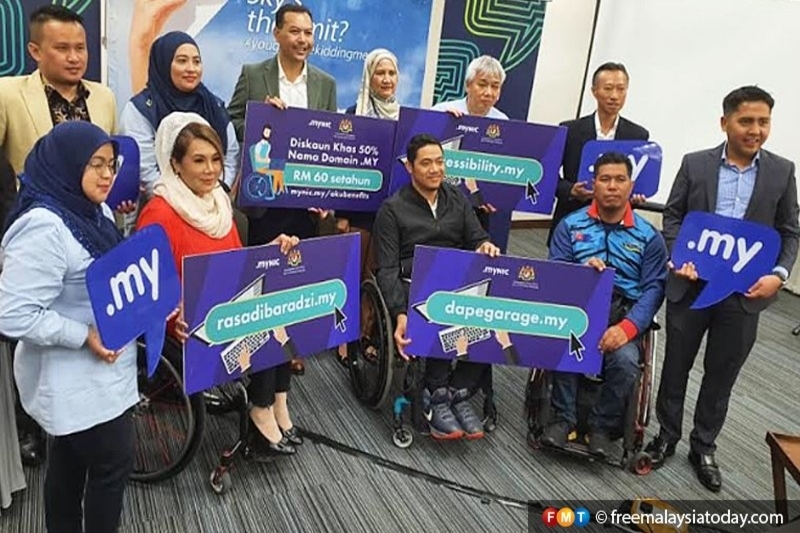
An agency under the ministry of communications and multimedia recently launched a programme to support and accelerate digital adoption among disabled (OKU) people in the country by bringing their businesses online.
MYNIC, the official .my domain registrar in Malaysia, aims to provide ICT and social media training to OKU organisations with its newly-launched outreach programme.
Apart from establishing their websites and teaching them about SEO (search engine optimisation), MYNIC will also work on enhancing the digital brand recognition of the SMEs and micro-SMEs via social media and other digital marketing platforms.
The founder and chairman of OKU Sentral, an NGO which campaigns for better facilities for disabled people, stated that he is very confident this can be done if people work together.
This initiative not only gives the NGO the opportunity to conduct businesses but it is also a way to give back to society. Moreover, it has been a long time coming for these communities.
With around 500,000 OKU in Malaysia, the programme will allow their businesses to have better access to both local and foreign markets and is part of a plan announced by Communications and Multimedia Minister Gobind Singh Deo on Dec 3 to give OKU a 50% discount for new domain registrations.
The lifetime discount, which reduces the annual fee from RM120 to RM60, started on 1 January 2020. The discount is valid for new .my registrations and each OKU individual is entitled up to five .my domain names.
Apart from making it easier for consumers to search for local businesses, MYNIC CEO stated that the .my domain names boost customer confidence as the owners have to be registered with the agency – thus reducing the likelihood of frauds and scams.
Together with the ministry, the NGO is playing its part in preparing the nation for a digital future, to unlock opportunities for digital innovations and to drive the digital economy as a core economic pillar of the country.
The OKU communities have a lot of good products they can export. Technology is making it easier for everyone to grow a successful business, and websites are a fundamental part of that.
The executive director of the National Council for the Blind Malaysia (NCBM) agreed that the initiative would go a long way in promoting inclusiveness for OKU. It was noted OKU, like other Malaysians, want opportunities for employment and education – he stressed that OKU communities are eager to reap the benefits of Malaysia’s digital revolution.
According to an earlier OpenGov Asia article, MDEC will helm the implementation of the plans, underpinned by the national theme of “Driving Growth and Equitable Outcomes Towards Shared Prosperity”, which was recently unveiled in Budget 2020.
The aim is to highlight the importance the government is placing on the nation’s digital economy to drive shared prosperity.
Currently, the Malaysian digital economy, on average, has grown 9% annually in value-added terms between 2010 to 2016. Statistically, this is faster than Malaysia’s overall GDP growth, highlighting the country’s digital economy as a growing source of expansion.
Despite Malaysia having developed a strong ICT base and digital technology that will eventually become a major force in the country’s economy, there is still more to be done.
As the current and next generations are different from the one that started with MSC in 1996, it is important to have a new coordinated approach between ministries and their agencies. This will ensure rapid progress as well as the continued push to achieve MSC’s original vision of creating a digital utopia.
In addition to the new initiatives, MDEC has been tasked with the creation and maintenance of a National Digital Skills Register. This registry will act as a guide for life-long learning initiatives that specifically target Malaysians who are facing challenges in the job market.
As Malaysia nears 2020, and with MSC Malaysia on the cusp of celebrating its silver jubilee in 2021, MDEC is being entrusted with the task of leading the digital economy and leapfrogging Malaysia into the Fourth Industrial Revolution.
















